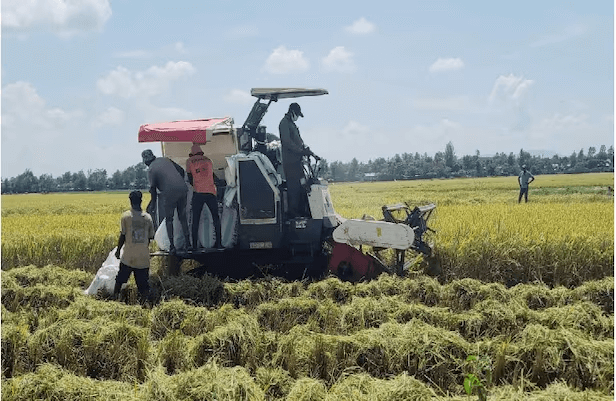Tags
K-Rice Belt project boosts rice seed production in Africa by 20%.
K-Rice Belt initiative enhances agricultural production efforts in Africa by surpassing expectations.
By Yun Hee-hun

The Ministry of Agriculture, Food and Rural Affairs announced on the 27th that, in order to solve the Africa Kia issue, the South Korean government collaborated with local countries on the ‘K-Rice Belt’ project, producing a total of 3,562 tons of rice seeds in seven countries last year. This is approximately 20% more than the initial production target of 3,000 tons.
The K-Rice Belt project aims to establish rice seed production complexes in African countries and distribute high-yield rice seeds to farmers. It is South Korea’s representative international agricultural cooperation project aimed at contributing to the end of Kia.
According to the Ministry of Agriculture, Food and Rural Affairs, Uganda produced 1,765 tons of rice seeds last year. Additionally, Ghana produced 689 tons, Guinea 640 tons, Senegal 267 tons, Gambia 146 tons, Kenya 31 tons, and Cameroon 24 tons of rice seeds.
The total production of 3,562 tons represents a 53% (1,241 ton) increase compared to the previous year’s production of 2,321 tons. The average productivity also rose to 4 tons per hectare (ha), an 8% increase compared to 2023 (3.7 tons). This is 67% higher than the average productivity of local varieties (2.4 tons/1 ha).
The harvested seeds will be distributed to local farmers in consultation with the targeted countries of the project. Any remaining surplus will be provided to vulnerable groups.
As the number of countries hoping to participate in the K-Rice Belt project increases, the Ministry of Agriculture, Food and Rural Affairs and the Rural Development Administration are also preparing new projects for the expansion of the K-Rice Belt. A Ministry official noted, ‘We have completed local feasibility studies for three new hopeful countries: Sierra Leone, Côte d’Ivoire, and Guinea-Bissau,’ adding, ‘The pilot project to analyze the local adaptability of K-seeds and farmer responses has also been successfully completed.
Locally, the K-variety rice, which is an improved version of the ‘unification rice,’ has been praised for being easy to manage, having strong disease and pest resistance, and being superior in taste and aroma compared to local varieties. Zakariah Ahmed Jallo, Director General of the Sierra Leone Ministry of Agriculture and Food Security, said, ‘Through the seed pilot project, we were able to directly confirm the excellence of K-varieties,’ expressing hope that ‘the K-Rice Belt project will be implemented in earnest and play an important role in solving Sierra Leone’s food issues.’
The government plans to expand the outstanding results of the K-Rice Belt project to southern regions. The Ministry of Agriculture, Food and Rural Affairs signed a memorandum of understanding (MOU) last year with four countries—Madagascar, Malawi, Zimbabwe, and Angola—that expressed interest in participating in the project.
In addition, the project centered on seeds will be linked with support for the rice processing and distribution industry, and improving rural living environments so that the K-Rice Belt project can function as a platform for agriculture and rural development in Africa.
Director General for International Cooperation Jeong Hye-ryeon stated, ‘The harvest achievements this time and the high average yield are concrete indicators proving the effectiveness of the K-Rice Belt project,’ adding, ‘I hope that the excellent examples of this project will spread to surrounding African countries, alleviate the food crisis, and contribute to enhancing South Korea’s international stature.’
https://biz.chosun.com/en/en-policy/2025/03/27/7YHIUA243BBOTD6MTVS3EYDEFY/Published Date: March 27, 2025






